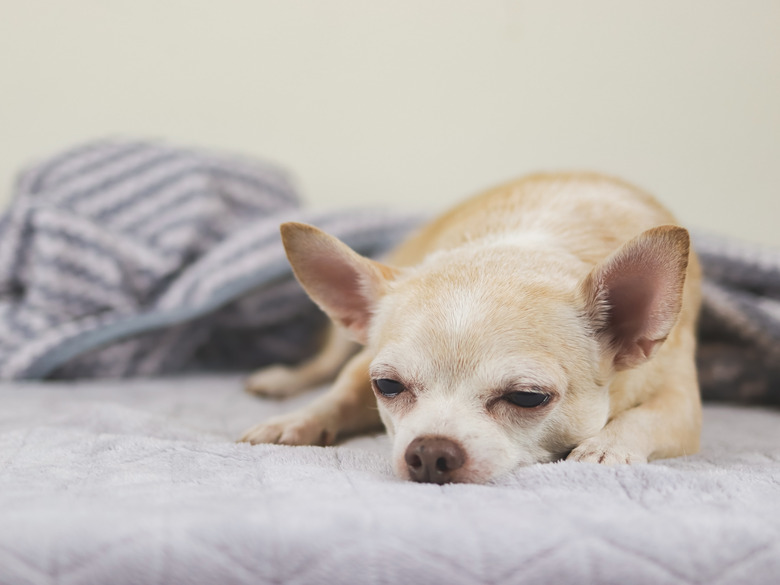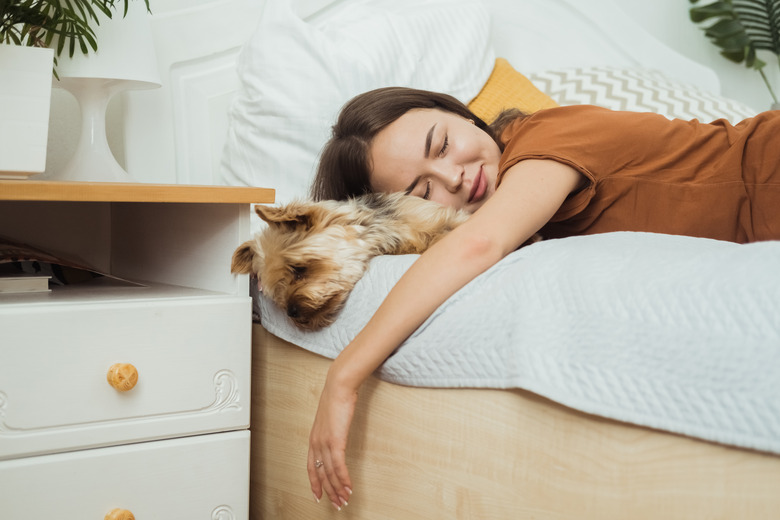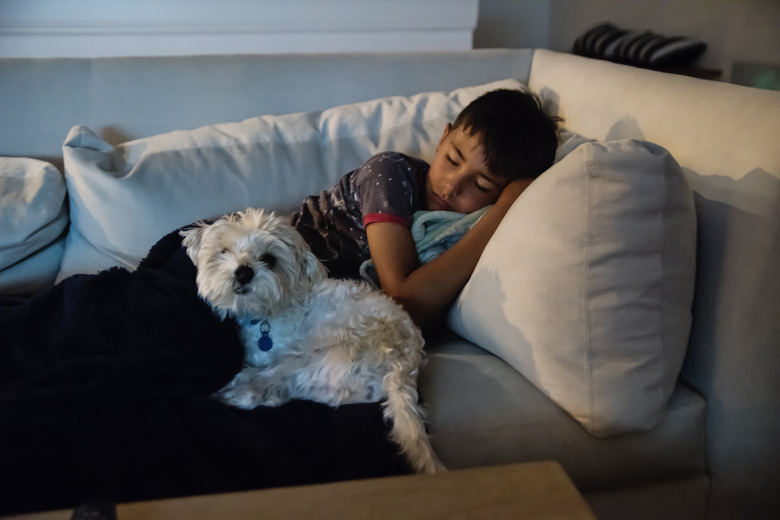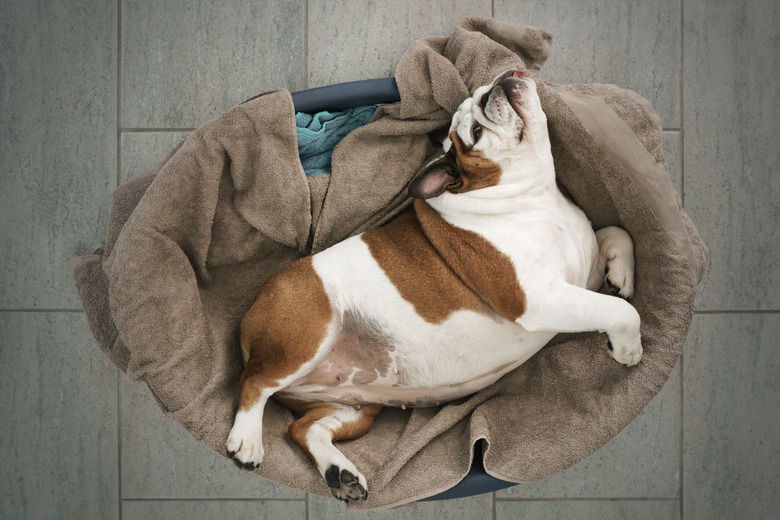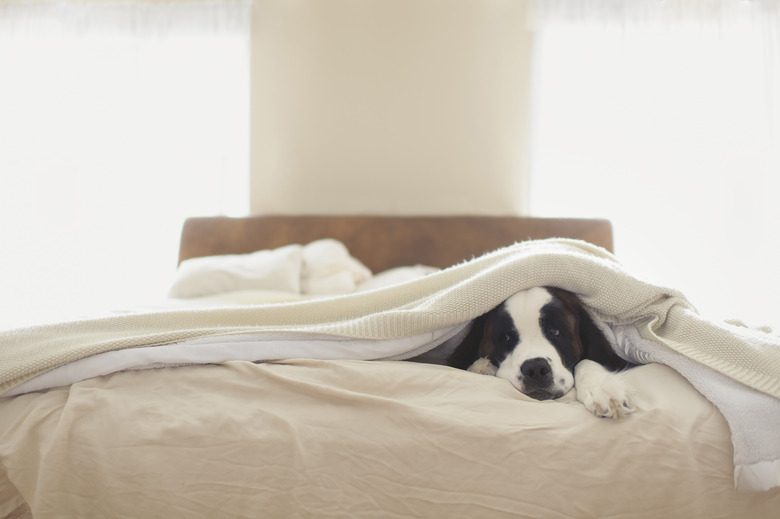Should I Let My Dog Sleep In My Bed With Me?
To share a bed with a dog, or not to share a bed with a dog...that seems to be a commonly asked question among pet parents, neither of which has an across-the-board answer! Co-sleeping with a dog is a personal preference, and, like any decision, comes with good and bad points. Sharing a bed with a dog can be a great stress reliever for people, unless that dog is disruptive at night, in which case it might be better to give them their own bed. Read on to learn more about whether sharing your bed with your dog may be right or wrong for you!
Dogs and sleeping arrangements
Dogs and sleeping arrangements
If you're wondering whether your dog should sleep next to you or in their own dog bed, that answer will depend on your personal preferences, as there is no right or wrong decision. If everyone is happy, sleeping well, and comfortable, then co-sleeping with a dog can be a great experience! When in a pack, dogs do tend to sleep with each other in small dens or other tight spaces, both as a protective measure and a bonding exercise. This doesn't mean that your dog has to sleep with you, or even wants to, as dog packs and dog-human relationships are not exactly the same things.
Some people are hesitant to share their bed with a dog after hearing that doing so will turn their pooch into the "alpha dog" of their relationship, and will then gain total control over that person and their bed. While dogs do form social hierarchies, it's important to understand why. Dogs, wolves, and other canids have social orders because they compete with each other for food and for mates. Their human counterpart is not in competition with them over meals or potential mates, and dominating them in an effort to gain "alpha" status is simply misinformation. Instead, dogs who display protective behavior are likely doing so as a way of resource-guarding rather than domination, which certainly can occur over a bed, bedding, or other material the dog sees as high-value.
One behavior that may be exacerbated by co-sleeping is separation anxiety, which occurs when a dog becomes distressed, anxious, and afraid upon being left alone. Symptoms of separation anxiety can include excessive barking and whining, property destruction, involuntary urination or defecation, and even self-harm. If your dog experiences separation anxiety, it's recommended that you consult a qualified behavior expert for a treatment plan. (Note that separation anxiety is a complex situation and requires a highly qualified trainer or behavior consultant. Not all dog trainers work on it, but a qualified and certified dog trainer should be able to refer you to someone who does.)
Pros and cons of co-sleeping with your dog
Pros and cons of co-sleeping with your dog
Cuddling up with a dog at night comes with its own set of pros and cons, so you'll want to weigh the bad vs. the good to make the best decision for your nightly routine. One major benefit of sleeping with your canine best friend is the stress-management side effects. Just petting a dog has been shown to lower cortisol levels.) and blood pressure in humans, and raises oxytocin production, which is also known as "the love hormone" for the good feelings it produces. Sleeping next to a dog can also help some pet owners feel a bit safer at night, both for the guardianship that dogs provide, and because they can generally rest assured that their dog isn't roaming the house or getting into trouble if they're right there next to them.
The downside of keeping your dog next to you at night mostly comes down to sharing limited space. Dogs sleep in a variety of positions, and while some of them are fairly compact and easy to sleep next to, others are not so compatible. Dogs can also be disruptive because of the noises they make throughout the night. Certain dog breeds are especially prone to snoring, namely brachycephalic (smush-faced) dogs like bulldogs, and dogs can add dirt, hair, allergens, and dust to our sleeping spaces.
Our furry friends are also, of course, known to bark at any time of the day or night, and this, combined with frequent movement, can be very disruptive to light sleepers. A dog that's not yet been housetrained can also be a huge headache for pet parents, which is why crate training is highly recommended, at least until your pooch is able to hold their bladder until it's time to wake up.
When to sleep alone
When to sleep alone
Of course, there will be instances where co-sleeping with your canine companion just isn't a good idea for one or both of you. Generally, if co-sleeping will compromise either of your quality of sleep, it's best to sleep separately, even if just temporarily.
- Injuries. If you or your dog are nursing an injury, it may be best to sleep solo, at least until the injury is healed. This can include anything from superficial cuts to broken bones—basically, anything that could result in pain if someone brushed up against or rolled over onto the area.
- Allergies. Curling up with a dog at the end of a long day is one of the sweetest feelings, but if you've got allergies to your pet's dander or saliva, then sleeping too close can cause irritating problems. In this case, it is probably best to keep your pet out of your bedroom, not only at night but during the daytime as well. If your allergy symptoms are mild, you could also consider keeping an air purifier in the room while you sleep or trying allergy medication to manage your symptoms if they're not threatening your respiratory health. Allergies can also include reactions to pests like fleas, which can appear on any dog that goes outside.
- Resource guarding. While the myth that sharing your bed with a dog will turn them into an "alpha dog" is just that, a myth, the hard truth for some people is that their pet may guard valuable resources. These resources may include blankets, pillows, and even shirts or other laundry that may be on the bed. Not all dogs who resource guard will guard your bedding or bed, but if your pet has displayed this behavior in your bedroom, it's absolutely essential that you keep separate sleeping areas.
- Space issues. It's almost impressive how even the smallest dog can somehow manage to take up the majority of even a large bed, . Even if they sleep in a sight ball, many will choose to place that ball right in the center of the mattress, or in that space that should be reserved for your knees. If your dog is just taking up too much space, it's totally OK to shut them out of the bedroom so that you can get a good night's sleep.
- Waking up in pain. Similarly, because of these seemingly nonsensical sleeping positions our dogs find themselves in, some people find themselves waking up with stiff necks, sore shoulders, and tight hips. If you're waking up in pain after a full night of sleep with your dog by your side, it may be worth sleeping solo, at least on occasion.
The bottom line
The bottom line
So, should I let my dog sleep with me? Whether or not you let your dog sleep in your bed with you is totally your choice—there is no right or wrong answer to answer to this question, and it will all depend on the person's preference. That said, sleeping with pets of all kinds can come with disruptions and discomfort, so if the annoying elements of it outweigh the good then it may be best to sleep separately, at least some of the time.
